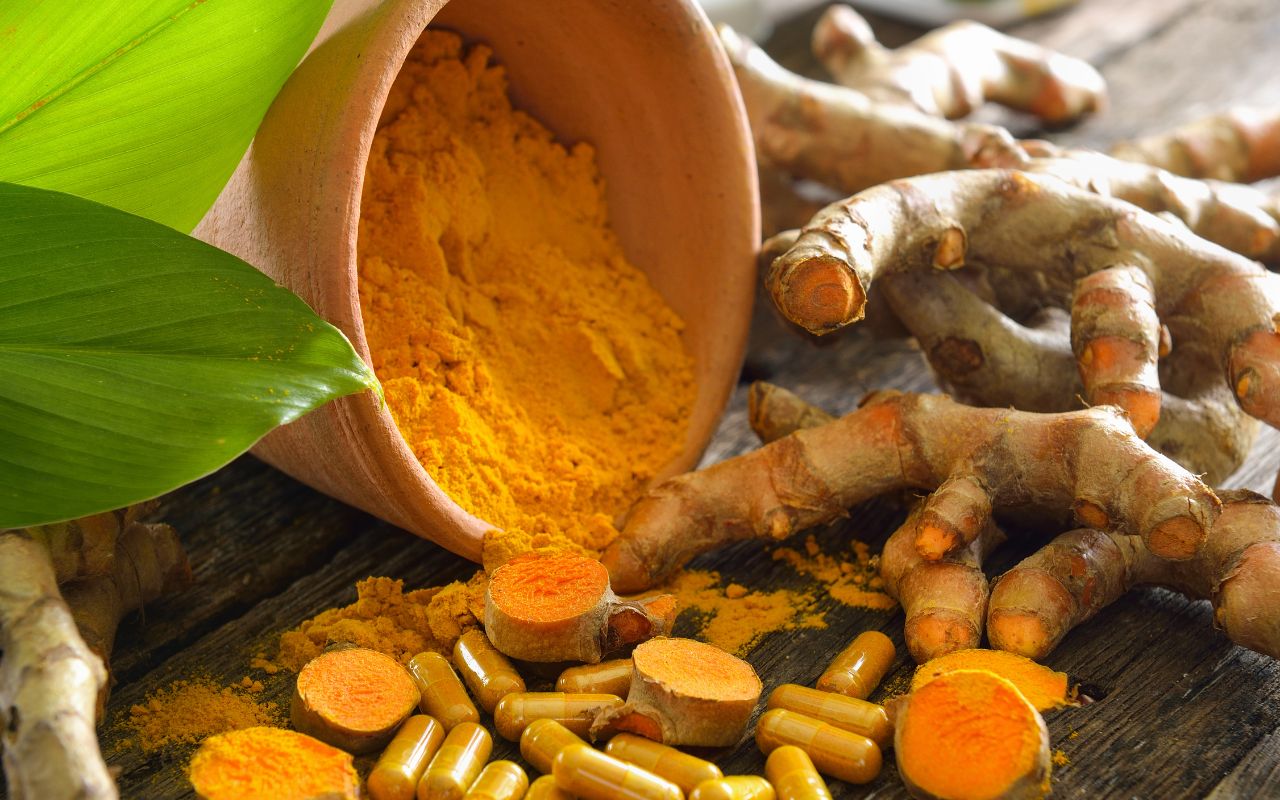Turmeric, scientifically known as Curcuma longa, is a golden-hued spice revered in various cultures for over 4,000 years. This vivid yellow root is more than just a staple in Indian cuisine—it's a powerful medicinal herb. From its origins in ancient Ayurvedic and Chinese medicine to its contemporary acclaim in Western health circles, turmeric's active component, curcumin, has been the subject of extensive research. This article explores the comprehensive health benefits of turmeric, delving into scientific studies and practical applications.
Turmeric's journey from spice racks to health supplements is a testament to its versatility. While it's celebrated for its anti-inflammatory and antioxidant properties, this robust ingredient promises much more. Let's explore how turmeric can be a beneficial addition to your health regimen.
Turmeric has long been a cornerstone in traditional medicine. Its uses span treating infections, skin diseases, digestive issues, and wound healing. The secret lies in curcumin, the bioactive turmeric compound that boasts potent anti-inflammatory and antioxidant properties. Modern studies have supported these ancient claims, uncovering numerous health benefits and practical applications.
One of turmeric's primary benefits is its ability to combat inflammation. Chronic inflammation is a known precursor to many diseases, including heart disease, cancer, metabolic syndrome, Alzheimer's disease, and various degenerative conditions. Curcumin, with its anti-inflammatory prowess, can neutralize inflammation at a molecular level. This property alone makes turmeric an invaluable tool in preventive health care.
Turmeric's role in managing digestive health is well-documented. Curcumin stimulates the gallbladder to produce bile, which aids digestion. The German Commission E, a scientific advisory board, has even approved turmeric for treating digestive problems. A double-blind, placebo-controlled study found that turmeric could significantly reduce symptoms of bloating and gas in individuals suffering from indigestion. This makes turmeric a natural, effective solution for maintaining a healthy digestive system.
Moreover, turmeric has shown promise in maintaining remission in ulcerative colitis, a chronic digestive tract disease. A double-blind study revealed that individuals in remission who took curcumin for six months had a significantly lower relapse rate compared to those who took a placebo. This highlights turmeric’s potential as a complementary treatment for individuals managing chronic digestive issues.
Turmeric's impact extends beyond digestion to joint health. Its anti-inflammatory properties make it a potential aid for managing osteoarthritis. A study involving an Ayurvedic formula containing turmeric, winter cherry, Boswellia, and zinc found that participants experienced reduced pain and disability. Although it’s challenging to pinpoint whether turmeric alone was responsible for these benefits, its role in reducing inflammation is undeniable.
In the context of rheumatoid arthritis (RA), turmeric's benefits are equally impressive. Rheumatoid arthritis is an autoimmune condition characterized by inflammation, pain, and joint stiffness. Some research suggests that curcumin can help alleviate these symptoms. A systematic review recommended taking 1,000 mg of curcumin daily to treat arthritis symptoms. Curcumin’s anti-inflammatory effects can significantly reduce the discomfort associated with RA, providing a natural adjunct to conventional treatments. For more information, Medical News Today provides an in-depth look at turmeric's role in managing RA.
Heart disease remains a leading cause of mortality worldwide, and turmeric might help combat it. Curcumin’s ability to improve endothelial function, which is the performance of the lining of the blood vessels, is crucial. A study highlighted that curcumin could be as effective as exercise in improving endothelial function. This improvement is vital since endothelial dysfunction is a significant driver of heart disease. Additionally, curcumin reduces inflammation and oxidation, contributing to heart disease.
In the realm of mental health, turmeric demonstrates the potential to mitigate symptoms of depression. Curcumin can boost brain-derived neurotrophic factor (BDNF), a growth hormone in the brain. Reduced levels of BDNF are linked to depression and other brain disorders. By increasing BDNF levels, curcumin could delay or reverse brain diseases and age-related decreases in brain function. Moreover, curcumin can enhance the production of serotonin and dopamine, both chemicals in the brain that regulate mood.
Turmeric’s potential in cancer prevention and treatment is another growing interest. Research indicates that curcumin can contribute to the death of cancerous cells and reduce angiogenesis (growth of new blood vessels in tumors) and metastasis (spread of cancer). For instance, a study published in Anticancer Research demonstrated that curcumin-induced apoptosis (programmed cell death) in colon cancer cells is caused by the production of reactive oxygen species (ROS) and the activation of caspase-3. Although more human studies are needed to confirm these findings, the preliminary evidence is promising.
Beyond internal health, turmeric can also enhance skin health. Its anti-inflammatory and antioxidant properties can benefit a variety of skin issues. A systematic review published in Phytotherapy Research highlighted turmeric’s positive effects on skin health, including its role in improving the skin’s natural radiance and treating conditions like eczema and acne. The review emphasized turmeric’s ability to modulate several dermatological conditions effectively.
The versatility of turmeric extends into everyday wellness practices. For those seeking a natural pain reliever, turmeric offers a viable alternative to over-the-counter medications. Several studies suggest that turmeric can work as effectively as ibuprofen for certain types of pain, including arthritis. This makes it a valuable option for individuals looking to manage pain without relying on synthetic drugs.
Turmeric’s antioxidant properties are another significant aspect of its health benefits. As an antioxidant, curcumin scavenges free radicals and harmful molecules that can damage cells. By neutralizing free radicals, curcumin can help prevent the oxidative stress that leads to chronic diseases. Additionally, turmeric enhances the body’s production of antioxidant enzymes, further bolstering its defense against oxidative damage.
While turmeric has many health benefits, it’s essential to be aware of potential side effects and interactions. Large doses of turmeric or curcumin can cause stomach upset and, in extreme cases, ulcers. Individuals with gallstones or bile duct obstructions should consult their healthcare provider before taking turmeric supplements. Moreover, turmeric can interact with certain medications, such as blood thinners and drugs that reduce stomach acid. The Mount Sinai Health Library is an excellent resource for a comprehensive list of interactions and precautions.
Despite its numerous benefits, turmeric supplements have not been extensively studied in children, and there is no recommended pediatric dose. Adults should consult their healthcare provider to determine the appropriate dosage. Pregnant and breastfeeding women are advised to avoid turmeric supplements due to the lack of sufficient research on its safety in these populations.
Incorporating turmeric into your daily routine can be as simple as adding it to your diet. Turmeric is a common ingredient in curries, but it can also be added to smoothies, teas, and soups. Curcumin supplements are widely available for those who prefer a more concentrated form. When choosing supplements, opting for reputable brands to ensure safety and efficacy is essential. Some supplements also include black pepper, which enhances the absorption of curcumin.
Given its impressive health benefits, turmeric is a superb addition to any health regimen. Its anti-inflammatory and antioxidant properties make it a natural ally in preventing and managing various health conditions. From improving digestion and joint health to potentially avoiding chronic diseases, turmeric offers a holistic approach to wellness. However, as with any supplement, it’s crucial to consult a healthcare provider to ensure it’s appropriate for your specific health needs.
In conclusion, turmeric is a powerful spice with a rich history in traditional medicine and a promising future in modern health practices. Its active ingredient, curcumin, is a potent anti-inflammatory and antioxidant that can benefit various aspects of health. You can harness its numerous health benefits by incorporating turmeric into your diet or as a supplement. Medical News Today offers a detailed overview of the benefits and uses of turmeric. The potential of turmeric is vast, and its role in promoting health and well-being continues to be supported by scientific research.









